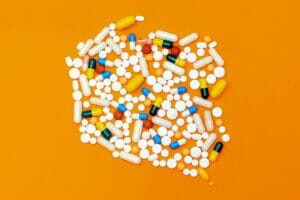Introduction to Ginseng
Ginseng is a type of herbal supplement that has been used for centuries in traditional Chinese medicine. It is derived from the root of the Panax ginseng plant, which is native to Asia, and is also known as Asian ginseng, Chinese ginseng, or Korean red ginseng. Ginseng extract is often used as a dietary supplement to increase energy, reduce stress, and improve overall health. It may also be used to treat certain medical conditions, such as high blood pressure and lower blood sugar levels.
However, ginseng may also increase the risk of adverse effects if taken in large doses or for long periods of time. It is important to consult with a health care provider before taking ginseng or any other herbal supplement. Possible side effects of ginseng include insomnia, headaches, and high blood pressure. In rare cases, ginseng abuse may lead to more serious health problems. Therefore, it is important to take ginseng as directed and to not exceed the recommended dosage.
Benefits of Taking Ginseng
Ginseng is a type of herbal supplement that has been used for centuries to treat a variety of ailments. It is believed to have many health benefits, including improving blood sugar levels, reducing fatigue, and boosting the immune system. American ginseng, Korean ginseng, and Siberian ginseng are the three main types of ginseng. Each type has its own unique set of benefits and side effects.

Ginseng is generally considered safe, but it can cause some side effects, such as headaches, insomnia, and nausea. It is important to talk to your doctor before taking ginseng supplements, as they can interact with certain medications, such as warfarin and diabetes medications. Additionally, pregnant women should avoid taking ginseng, as it may lead to adverse effects.
Studies have shown that ginseng can reduce blood sugar levels, improve energy levels, and even help treat erectile dysfunction. Korean red ginseng extract has also been linked to improved cognitive function in children. Ginseng is likely safe when taken in recommended doses, but it is important to talk to your doctor before taking ginseng supplements.
Potential Side Effects of Taking Ginseng
Ginseng is a popular herbal supplement that has been used for centuries to treat a variety of ailments. While ginseng is generally considered safe, there are potential side effects associated with taking it. Common side effects of ginseng use include headaches, insomnia, and nausea. Taking panax ginseng or North American ginseng may also cause dizziness, diarrhea, and high blood pressure. Ginseng supplementation may also interact with certain medications, such as warfarin, and cause side effects.
Ginseng contains a variety of chemicals, including ginsenosides, which are thought to be responsible for its effects. Studies show that ginseng has no effect on blood pressure, but it may reduce blood sugar levels. Ginseng has also been linked to electrocardiographic and hemodynamic effects, and it may cause side effects in patients taking certain medications. Research has also shown that ginseng may be beneficial for treating erectile dysfunction, but more research is needed to confirm this. In general, ginseng seems to be safe when taken in recommended doses, but it is important to talk to your doctor before taking ginseng or any other supplement.
Who Should Not Take Ginseng
Ginseng is an herbal supplement that has been used for centuries to treat a variety of ailments. While ginseng is generally considered safe, there are certain people who should not take it. People who are pregnant or breastfeeding should avoid taking ginseng root, as it can have effects on the baby. People who are taking warfarin or other blood thinners should also avoid taking ginseng, as it can interact with these medications. People with diabetes should also be cautious when taking ginseng, as it can lower blood sugar levels. Additionally, people with schizophrenia should not take ginseng, as it can worsen symptoms.
People who are taking medications for erectile dysfunction should also avoid taking ginseng, as it can interact with these medications. Additionally, people who are taking energy drinks should not take ginseng, as it can interact with the chemicals in the drinks. People who are taking diabetes medications should also be cautious when taking ginseng, as it can interact with these medications. Finally, children should not take Korean red ginseng, as it can have adverse effects on their health. In general, ginseng is considered safe, but it is important to be aware of the potential side effects and interactions before taking it.
Interactions with Other Medications
Interactions with other medications are an important consideration when taking ginseng. It is important to be aware of the potential side effects of ginseng, as well as the effects of panax ginseng, korean red ginseng, and red ginseng for treating erectile dysfunction. Ginsenoside, a component of ginseng, has been linked to effects of dietary supplementation, and ginseng products are often standardized to contain specific amounts of american ginseng extract.

Taking more than the recommended daily dose of ginseng is possibly unsafe, and there have been reports of adverse effects when taking korean red ginseng in patients with certain conditions. Research has also shown that ginseng can reduce the effects of energy drinks, and that ginseng did not affect blood pressure when taken with ginkgo biloba.
Furthermore, Korean red ginseng has been shown to improve cognitive function in children, and fermented red ginseng has been linked to improved erectile function. In general, ginseng is likely safe when taken in recommended doses, and is safe during pregnancy. However, it is important to be aware of potential interactions with other medications, such as warfarin and diabetes medications, as ginseng might decrease or lower blood sugar when taken with these medications.
Conclusion
Ginseng is a plant that has been used for centuries for its medicinal properties. It is available in many forms, including dried, and contains chemicals called ginsenosides. While ginseng is generally safe, there are some side effects that have been reported. These include headaches, insomnia, and diarrhea. It is important to note that ginseng should not be taken if you are pregnant, have schizophrenia, or are taking warfarin or other medications. Ginseng is often used to treat a variety of conditions, including diabetes, high blood pressure, and fatigue. Research has shown that ginseng and its components, such as ginsenoside RG1, can reduce blood sugar levels and improve cognitive function. Korean red ginseng has also been shown to improve physical performance and reduce fatigue in children. Fermented red ginseng has been found to improve immune function and reduce inflammation.
The effects of ginseng vary depending on the type of ginseng used. Asian ginseng is more likely to reduce blood sugar levels, while American ginseng is more likely to improve cognitive function. A standardized extract of American ginseng, G115, has been found to increase levels of cGMP, a compound involved in blood vessel relaxation.
In general, ginseng is safe to take in recommended doses. For adults, the recommended dose is 200-400 mg of American ginseng per day. It is important to note that ginseng should not be taken with diabetes medications, warfarin, or other medications. Additionally, ginseng should not be taken with ginkgo biloba, as this can increase the risk of bleeding.
Overall, ginseng is a safe and effective herbal remedy that has been used for centuries. It can be used to treat a variety of conditions, including diabetes, high blood pressure, and fatigue. However, it is important to note that ginseng should not be taken with certain medications or if you are pregnant or have schizophrenia. Additionally, it is important to take the recommended dose of ginseng and to avoid taking it with ginkgo biloba.

FAQ’s:
Q1: Are there any side effects of ginseng?
A1: Yes, there are potential side effects of ginseng, including headaches, insomnia, and gastrointestinal issues.
Q2: What are the effects of Korean red ginseng?
A2: The effects of Korean red ginseng may include improved cognitive function, increased energy, and improved immune system.
Q3: What are the effects of red ginseng?
A3: The effects of red ginseng may include improved cognitive function, increased energy, and improved immune system.
Q4: What are the effects of ginsenoside?
A4: Ginsenoside is a compound found in ginseng that may have a variety of effects, including improved cognitive function, increased energy, and improved immune system.
Q5: Is ginseng safe?
A5: Yes, ginseng is generally considered safe when taken in recommended doses. However, it is important to speak with your healthcare provider before taking ginseng.
Q6: What are the effects of dried ginseng?
A6: Dried ginseng may have a variety of effects, including improved cognitive function, increased energy, and improved immune system.
Q7: How much ginseng has been used?
A7: Ginseng has been used for centuries in traditional Chinese medicine and is now widely used in many countries. The recommended dose is typically between 200-400 mg of American ginseng per day.



 Ginseng And Weight Management
Ginseng And Weight Management
